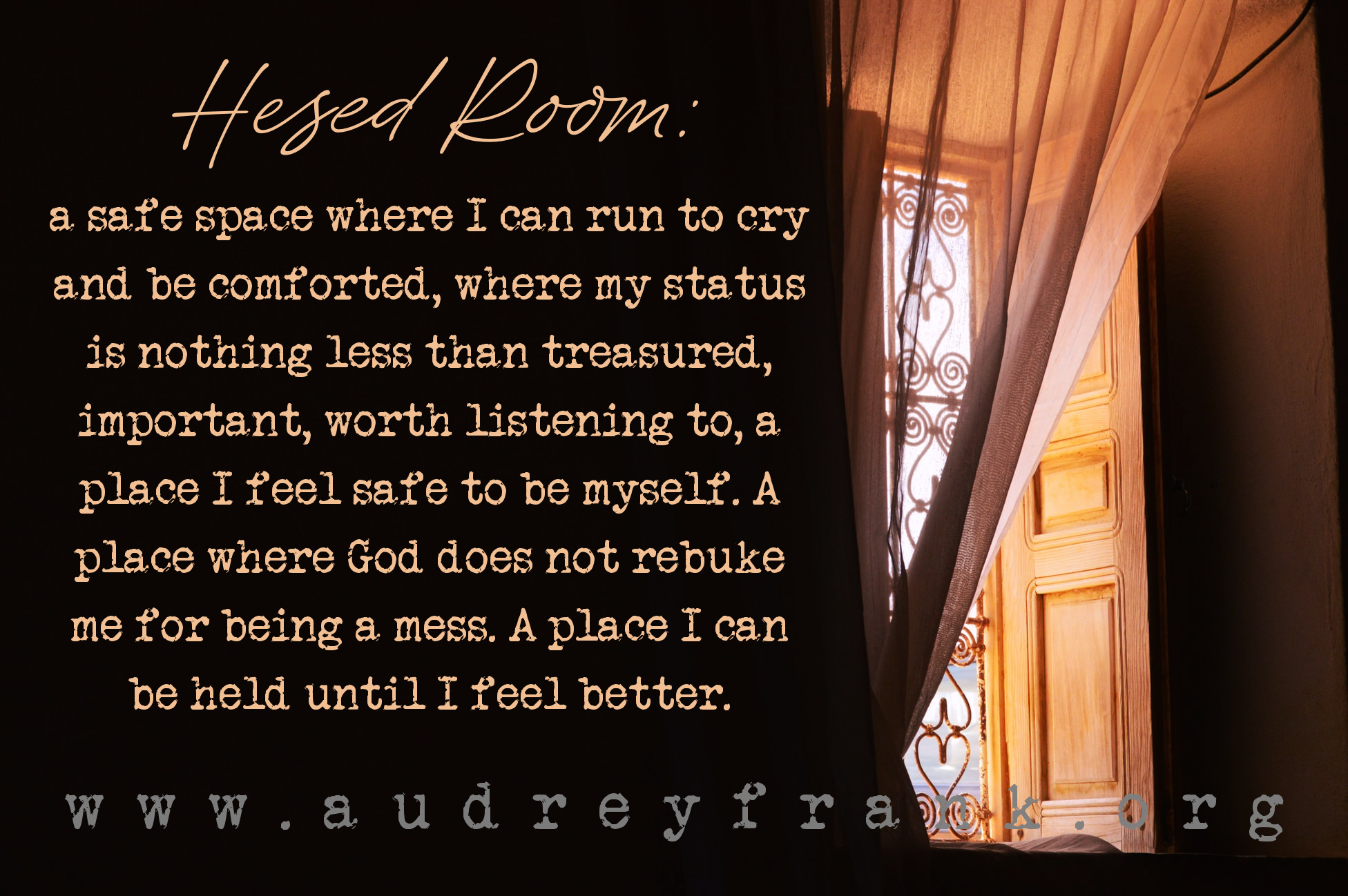The Hesed Room

O my Strength, I watch for you; you, O God, are my fortress, my hesed (loving) God (Psalm 59:9).
With everlasting hesed (kindness) I will have compassion on you, says the Lord, your Redeemer (Psalm 54:8b).
Hesed: (Hebrew) to be merciful, faithful. Love, kindness, mercy. One of the most important words in the Old Testament, hesed essentially denotes an act of kindness, love, or mercy. The quality of the kindness shown is usually that reserved for close friends and family members. Hesed is central to God’s character. His covenant with His chosen people may be thought of as the relationship from which the hesed flows. God’s hesed, however, is not bound by the covenant itself, and though people may prove unfaithful to this relationship, God’s hesed is everlasting.
I witnessed hesed in a medieval city where women still live in harems and men guard them like treasured possessions.
The narrow staircase wound up and around like a mysterious passageway to secrets undisclosed. I climbed slowly, emerging at the top into a secluded series of private rooms reserved just for women of marriageable age. I was exempt from harem because I was married, the wife of an honored foreign guest. My husband sat three floors below in an elegant salon sipping hot, sweet mint tea with our host.
Gauzy curtains thin as onion skin gently wafted in, out, and in again, moved by the hand of the warm Sahara wind. Hand-embroidered blue stars twinkled in the golden sunlight. The blues and reds of the mosaic tile shuffled like children in a game of musical chairs, alternating shades of shadow and brilliance.
The floor was cool despite the hot sun outside. I felt I had trespassed, treading unintentionally upon a special place, a hushed place resplendent with something wonderful I couldn’t quite identify.
Tiptoeing like a whisper, I scanned the room for the person I sought. Our host had sent me to fetch his sister, and these were her quarters.
Not seeing a soul, I called,
Salaamu-alikum! Yasmina! Hello! Anyone here?
Nothing.
I stood very still, wondering if I should press further into this magical room or withdraw discreetly. Just as I turned to go, the sound of sniffles and a child softly crying reached my ears.
Around a corner appeared Yasmina, her small niece in her arms. The little girl couldn’t have been more than six years old. She was clinging to Yasmina, arms and legs firmly wrapped around, her head tucked into Yasmina’s neck. Yasmina spoke soft words I could not hear, crooning with a compassion that made me embarrassed for having intruded upon this sacred moment of comfort between woman and child.
Forgive me. I will come back later, I murmured clumsily, my face flooded crimson.
Yasmina cast me a look of gratitude and continued consoling the little one in her arms.
I quietly disappeared back downstairs. Back to the formal space, the public space, the man space, the guest space, the place where people deemed of higher stature talked, visited, ate, and rested. Where spilled tea and spilled tears raised a fuss. The place where children and adults were hushed and rebuked for crying, along with the words, “Mktb Allah! It was written by God!”
In other words, stop crying. God knew whatever made you cry would happen and don’t you dare argue with his will by crying.
But part of me, a hidden, wistful piece of my soul, remained upstairs in that beautiful, mysterious room, the room where a little girl could run to cry and be comforted, where her status was nothing less than treasured, important, worth listening to, a place she felt safe to be herself. A place where God did not rebuke her. A place she could be held.
Fatima Mernissi, Moroccan scholar, teacher, writer, and sociologist, described the upstairs from her girlhood days living in a harem:
“Life upstairs was so much easier, especially since everything was also accompanied by hanan, a Moroccan emotional quality that I have rarely encountered elsewhere. Hanan is hard to describe exactly, but basically, it is a free-flowing, easygoing, unconditionally available tenderness. People who give hanan, like Aunt Habiba, never threaten to withdraw their love when you commit some unintentional minor or even major infraction. Hanan was hard to come by downstairs, especially among the mothers, who were too busy teaching you to respect the frontier to bother with tenderness.” (Mernissi, Fatima, The Harem Within: Tales of a Moroccan Girlhood Great Britain: Doubleday, 1994: 17.).
My language teacher, when I tried to describe the experience, nodded knowingly.
You have encountered hanan.
She continued.
There is no satisfactory word for hanan in English. Some translate it grace, others mercy. But neither is sufficient. Hanan is love, kindness, mercy, and grace all together, the kind of love we all wish for. Hanan is love that you can run to when you are ashamed and your heart is broken. Hanan will never punish you for needing love. It will never abandon you.
The Hebrew concept of hesed faces a similar translation problem to the Arabic concept of hanan. Both are dynamic and multi-faceted; both convey compassion, love, and mercy. Both are hard to capture in one English word.
Hesed is found over 240 times in the Old Testament. The more I studied God’s lovingkindness, His hesed, the more I thought about my Muslim friends’ concept of hanan. I felt I had stumbled not only upon hanan in that upstairs room but an illustration of hesed, the love that our souls long for but rarely encounter amongst ourselves. The constant, embracing love of the Father that invites us to come away upstairs, to what I have come to call the hesed room.
The problem is, we often think of God more like a downstairs God, a mother or father who is too busy teaching us the rules of right behavior to bother much with tenderness.
But we need an upstairs God. We need a God who does not withdraw His love from us when we don’t have our act together, when we try to do the right thing and fail, or when we just outright do the wrong thing because we gave in. This is the very self we need to be saved from, the self who cannot hold it all together without being held by a stronger power, a greater love.
What astonishing, marvelous news to discover that God loves us with such love!
There is a sacred, safe place for us in the arms of God. A place where we can approach on our worst day with our worst fears. #hesed #compassion #kindness Share on XThe hesed room is a space where we can let the tears flow, where we can be simply held for as long as we need to be. God invites us upstairs, where His lovingkindness and mercy flow out of His everlasting covenant love.
Lord, my strength, I run to you; You, O God are my fortress, my hesed (loving) God. Amen.

The Conversation
What a beautiful way to describe the love of God.
Thank you Susan. There are some things we learn in unexpected places, don’t we? Love to you and your family today.